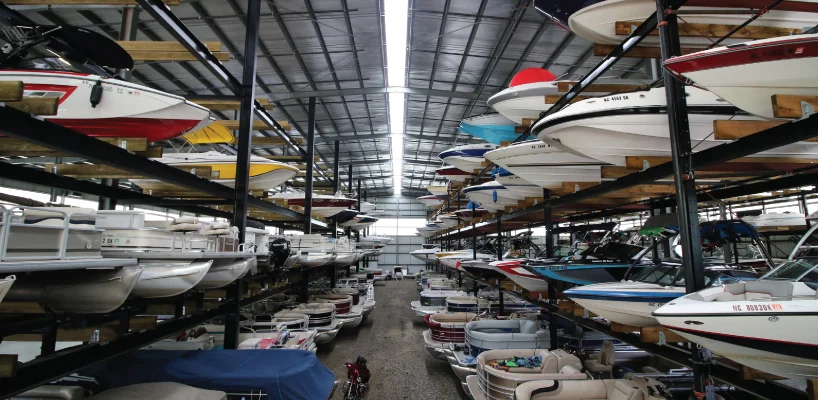Indoor boat storage offers exceptional protection from weather damage and improves security measures. There are many different types of indoor and outdoor boat storage units, each with different storage methods. When it comes to the price, it depends on several factors, with indoor being more expensive than outdoor boat storage.
Overview
Are you searching for a reliable solution to keep your boat safe and secure year-round? Indoor storage for boats provides the perfect solution. It is essential to protect your boat from unpredictable weather and potential damage.

According to a recent study by BoatUS, more than 65% of boat damage is caused by weather-related incidents.
Indoor boat storage offers protection from harsh weather conditions, UV rays, and vandalism. It ensures that your boat remains in pristine condition.
In this blog, we will discuss the types, benefits, costs, and reasons why you should choose indoor boat storage.
Why is Indoor Boat Storage a Better Idea?
Let us discuss why indoor boat storage is the preferred choice for boat owners.
- Protection from the Elements: Indoor storage protects your boat from harsh weather conditions such as rain, snow, hail, and UV radiation. This helps prevent damage to the boat's exterior, including fading, corrosion, and water damage.
- Security: Indoor storage facilities typically have security measures, such as surveillance cameras, gated access, and on-site personnel. It reduces the risk of theft, vandalism, or unauthorized access to your boat.
- Reduced Wear and Tear: Storing your boat indoors helps minimize wear and tear caused by exposure to the elements. This includes fading of paint and upholstery, deterioration of rubber components, and corrosion of metal parts.
- Pest Control: Indoor storage facilities are generally better equipped to control pests such as rodents and insects. These pets can cause damage to boats by chewing through wiring, upholstery, and other materials.
- Longer Lifespan: Indoor storage can help extend your boat's lifespan by protecting it from the damaging effects of weather, UV exposure, and pests. This reduces the need for costly repairs and maintenance over time.
- Convenience: Indoor storage facilities often provide easy access, climate control, and maintenance services, making it more convenient for boat owners to store and maintain their vessels.
Types of Indoor Boat Storage
There are primarily two types of indoor boat storage. Let us discuss them:
| Storage Type | Description | Benefits |
|---|---|---|
| Dry Stack Storage | Also known as dry stack marinas, this type involves storing boats in racks within a large warehouse-like building. Boats are lifted in and out of the water using forklifts or cranes. | Convenient - Protects from weather damage, UV rays, and corrosion |
| Enclosed Storage Units | Enclosed storage units are individual units within a larger indoor facility, like storage units used for personal belongings. Boat owners rent these units to store their vessels securely. | Secure storage - Protection from weather, theft, and vandalism - Customizable size options |
Indoor V/S Outdoor Boat Storage
Storing your boat indoors offers numerous benefits, including superior protection from the elements. However, this comes at a higher cost.
On the contrary, outdoor storage can be more affordable and convenient, though it may provide less shelter from weather conditions.
Curious about your moving costs? Fill out the details, and we’ll calculate them for you.
Free Instant Quote
Fields marked with an * are required
Let us discuss the difference between indoor and outdoor boat storage units in detail.
| Aspect | Indoor Boat Storage (Average) | Outdoor Boat Storage (Average) |
|---|---|---|
| Protection | Fully sheltered from elements, reducing weather damage and wear. | Partial protection, subject to weather conditions such as rain, snow, and UV exposure. |
| Security | Typically, it is more secure with controlled access and surveillance. | Security measures may vary; they may rely on fencing or surveillance cameras. |
| Cost | Generally higher due to added amenities and protection. Average cost: $200 - $400 per month. | Lower cost compared to indoor storage. Average cost: $100 - $200 per month. |
| Accessibility | May have limited access hours or require scheduling for retrieval. | Typically, it is more accessible for owners, allowing easier retrieval. |
| Maintenance | Reduced risk of damage from weather elements, potentially lowering maintenance costs. | Increased risk of weather-related damage may require more frequent cleaning and maintenance. |
| Space Availability | Limited availability, especially during peak seasons. | Generally, more space is available, with options ranging from open lots to covered areas. |
Looking for the best storage unit? Check out our Storage Guide.
Average Cost of Indoor Boat Storage
The average cost of indoor boat storage can vary widely depending on factors such as location, the size of the boat, and the amenities the storage facility offers.
| Boat Size | Average Cost per Month |
|---|---|
| Small (under 20 ft) | $100 - $200 |
| Medium (20-30 ft) | $200 - $400 |
| Large (30-40 ft) | $400 - $600 |
| Extra Large (40+ ft) | $600+ |
Note: Keep in mind that these are approximate averages, and actual prices may vary depending on location, facility amenities, and other factors.
Curious to know how much does it costs to build a storage unit? Check out
How Much Does It Cost To Build 100 Storage Units?
Why Should You Choose Indoor Boat Storage?
Indoor boat storage offers numerous advantages over other boat storage options. From protection against climate events to enhanced performance and cost savings, there are compelling reasons to opt for indoor storage for your boat.
| Aspect | Benefits |
|---|---|
| Climate Event Protection | Shield from extreme weather like rain, snow, and hail, ensuring boat safety. |
| Enhanced Performance & Cost Savings | Preserve performance, reduce repair costs, and minimize corrosion. |
| Safety Measures | Advanced security systems deter theft, vandalism, and unauthorized access. |
| Simplified Maintenance | Reduce cleaning and upkeep tasks, extending the boat's lifespan. |
| Environmental Conservation | Minimize pollutants and prevent accidental spills, contributing to conservation efforts. |
| Insurance Considerations | Potential for discounted premiums due to reduced risk, offering financial benefits. |
Looking for affordable Storage Units?
Read Economical Storage Units to learn more.
Reasons to Invest in Indoor Boat Storage
Here are the main reasons to invest in indoor boat storage.
- Safety from the Elements: According to a study by BoatUS, nearly 50% of all boat insurance claims are related to weather-related incidents such as storms, hail, and wind damage. Storing your boat indoors significantly reduces the risk of such damage, preserving its value and minimizing repair costs.
- Enhanced Security Measures: The National Insurance Crime Bureau reports that approximately 6,000 boats are stolen annually in the United States. Indoor storage facilities with enhanced security measures, such as surveillance cameras and gated access, can greatly reduce the risk of theft and vandalism.
- Extended Lifespan: Research from the National Marine Manufacturers Association (NMMA) indicates that indoor boats experience less wear and tear than outdoors. Indoor storage protects boats from sun exposure, which can cause fading and deterioration of upholstery and fiberglass, ultimately extending the vessel's lifespan.
- Maintained Resale Value: According to the Boat Owners Association of The United States (BoatUS) data, boats stored indoors retain their value better than those stored outdoors.
- Convenient Amenities: A survey conducted by Marinas.com found that 75% of boat owners cite convenience as a significant factor in their choice of storage location. Indoor storage facilities often offer easy access, cleaning services, and maintenance assistance, saving boat owners time and effort.
Factors to Consider Before Choosing Indoor Boat Storage Units
Choosing the right indoor boat storage involves considering a few key factors:
| Factors to Consider | Description |
|---|---|
| Boat Size and Type | Choose a storage unit that can accommodate your boat's size and type. |
| Climate and Environmental Conditions | Look for climate-controlled units to protect against weather-related damage. |
| Accessibility and Convenience | Select a location that is easily accessible and convenient for transporting your boat. |
| Security Measures | Ensure the facility has robust security features like surveillance and secure locks. |
Maintenance Tips for Stored Boats
Here are some maintenance tips to keep in mind when storing your boat:
- Clean Thoroughly: Before storing your boat, clean it thoroughly to remove any dirt, grime, or salt residue. This helps prevent corrosion and damage during storage.
- Inspect for Damage: Conduct a thorough inspection of your boat for any signs of damage or wear and tear. Address any issues before storing them to prevent them from worsening over time.
- Engine and Fuel Care: Properly winterize the engine and fuel system to prevent corrosion and deterioration. Follow manufacturer guidelines for winterization procedures.
- Battery Maintenance: Remove the battery from the boat or use a trickle charger to keep it charged during storage. Check and top up electrolyte levels if necessary.
- Protect Exposed Surfaces: Apply wax or protective coatings to exposed surfaces like fiberglass, metal, and upholstery to prevent UV damage and deterioration.
- Cover Properly: Use a high-quality boat cover to protect your boat from dust, debris, and UV rays. Ensure the cover is securely fastened to prevent it from coming loose during storage.
Worried about how to start your moving? Check out our Moving Guide.





